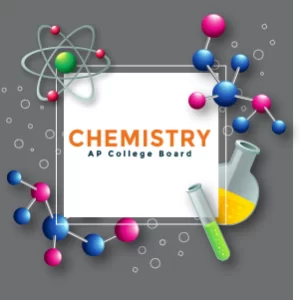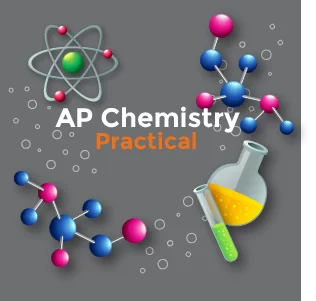AP Chemistry Information
- Posted by Chemistry instructor
- Categories Blog
- Date February 21, 2024

The Advanced Placement Program® commonly known as AP collage board, has enabled millions of students to take college-level courses and earn college credit, advanced placement, or both, while still in high school. AP Exams are given each year in the month of May. Students who earn a qualifying score on an AP Exam are typically eligible, in college, to receive credit, placement into advanced courses, or both. Every aspect of AP course and exam development is the result of collaboration between AP teachers and college faculty. They work together to develop AP courses and exams, set scoring standards, and score the exams. College faculty review every AP teacher’s course syllabus.
The AP Chemistry course provides students with a college-level foundation to support future advanced coursework in chemistry. Students cultivate their understanding of chemistry through inquiry-based investigations, as they explore content such as:
- Atomic structure,
- Intermolecular forces and bonding,
- Chemical reactions,
- Kinetics,
- Thermodynamics,
- Equilibrium.
The AP Chemistry course is designed to be the equivalent of the general chemistry course usually taken during the first college year.
PREREQUISITES:
Students should have successfully completed a general high school chemistry course and Algebra II.
LABORATORY REQUIREMENT:
This course requires that 25 percent of instructional time engages students in lab investigations. This includes a minimum of 16 hands-on
labs (at least six of which are guided inquiry). It is required that students keep a lab notebook throughout.
The course content is organized into nine commonly taught units, which have been arranged in the following suggested, logical sequence:
Unit 1: Atomic Structure and Properties
Unit 2: Molecular and Ionic Compound Structure and Properties
Unit 3: Intermolecular Forces and Properties
Unit 4: Chemical Reactions
Unit 5: Kinetics
Unit 6: Thermodynamics
Unit 7: Equilibrium
Unit 8: Acids and Bases
Unit 9: Applications of Thermodynamics
Each unit is broken down into teachable segments called topics.
The following big ideas serve as the foundation of the course, enabling students to create meaningful connections among
concepts and develop deeper conceptual understanding:
- Scale, Proportion, and Quantity: Quantities in chemistry are expressed at both the macroscopic and atomic scales, and
relationships exist both within and between these two scales. - Structure and Properties: Properties of substances observable at the macroscopic scale emerge from the structures of atoms and molecules and the interactions between them.
- Transformations: Chemistry is about the rearrangement of matter, both macroscopically and sub-microscopically.
- Energy: Energy plays important roles in characterizing and controlling chemical systems.

The following science practices describe what skills students should develop during the course:
- Models and Representations: Describe models and representations, including across scales.
- Question and Method: Determine scientific questions and methods.
- Representing Data and Phenomena: Create representations or models of chemical phenomena.
- Model Analysis: Analyze and interpret models and representations on a single scale or across multiple scales.
- Mathematical Routines: Solve problems using mathematical relationships.
- Argumentation: Develop an explanation or scientific argument
AP CHEMISTRY EXAM: 3 HOURS, 15 MINUTES
Assessment Overview
The AP Chemistry Exam assesses student understanding of the science practices and learning objectives outlined in the course framework. The exam is 3 hours and 15 minutes long and includes 60 multiple-choice questions and 7 free-response questions. Starting with the 2022-23 school year (spring 2023 exam), a scientific or graphing calculator is recommended for use on both sections of the exam. Students are provided with the periodic table and a formula sheet that lists specific and relevant formulas for use on the exam.
Format of Assessment
Section I:
Multiple-choice | 60 Questions | 90 Minutes | 50% of Exam Score with
Science Practices 1, 2, 4, 5, and 6 are all assessed in the multiple-choice section (Science Practice 3 is not assessed)
Section II:
Free response | 7 Questions | 105 Minutes | 50% of Exam Score with All six science practices are assessed in the free-response section.
- 3 long-answer questions (10 points each).
- 4 short-answer questions (4 points each).
Tag:AP Chemistry
ABOUT INSTRUCTOR
B.Sc (honors) Chemistry, M.Sc. (Organic Chemistry), Gold Medalist from Gujarat University Ahmedabad. Passionate educator, helping aspirants for IIT-JEE, NEET-UG, AP-Chemistry, IB-HL Chemistry, BIT-SAT, CBSE, and ICSE to achieve their ambitions
You may also like
Acid catalyzed dehydration of alcohols
Acid catalyzed dehydration of alcohols Cracking Organic Chemistry: Top 5 Tips to Master Acid Catalyzed Dehydration of Alcohols. A blog post that provides valuable insights …
How to crack NEET UG 2025
How to crack NEET UG 2025 How to crack NEET UG 2025 How to prepare for NEET UG in 6 months The NEET (UG) is …
Friedel craft alkylation reaction
Friedel craft alkylation reaction Table of Contents Introduction The world of organic chemistry offers a fascinating array of reactions that unlock a myriad of possibilities …
